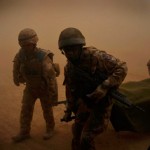
No other conclusion can be drawn from the circular, contradictory, confusing statements that the war’s commanders and supporters keep making. President Barack Obama, in an interview with CBS taped last Friday, said it is “important for our national security to finish the job in Afghanistan.” But as the war’s deadliest month for U.S. troops came to an end, Obama was far from definitive about just what this job might be.
“Nobody thinks that Afghanistan is going to be a model Jeffersonian democracy,” Obama said. “What we’re looking to do is difficult—very difficult—but it’s a fairly modest goal, which is: Don’t allow terrorists to operate from this region. Don’t allow them to create big training camps and to plan attacks against the U.S. homeland with impunity.”
But if the war’s aim is to eliminate the al-Qaida base in Afghanistan from which the Sept. 11, 2001, attacks were launched, that goal was accomplished long ago. There is no substantial al-Qaida presence in the country anymore; the terrorist network’s affiliates in places such as Yemen and Somalia are much more robust, and the leadership is believed to be hiding in Pakistan. What sense does it make to fight al-Qaida where it used to be, rather than where it is now?
When he announced his escalation of the war, Obama described his troop increase as a temporary surge and pledged to begin a withdrawal next July. The administration continues to insist that this is official policy—but warns us not to expect, you know, an actual withdrawal.
“My personal opinion is that drawdowns early on will be of fairly limited numbers,” Defense Secretary Robert Gates said Sunday. “I think we need to re-emphasize the message that we are not leaving Afghanistan in July of 2011. We are beginning a transition process and a thinning of our ranks, and the pace will depend on the conditions on the ground.”
Gates claimed that the administration’s policy in Afghanistan is “really quite clear.” But this is how he described it: “We are in Afghanistan because we were attacked from Afghanistan, not because we want to try and build a better society in Afghanistan. But doing things to improve governance, to improve development in Afghanistan, to the degree it contributes to our security mission and to the effectiveness of the Afghan government in the security area, that’s what we’re going to do.”
Adm. Mike Mullen, chairman of the Joint Chiefs of Staff, gave a similar description of the U.S. mission: “Afghanistan has to be stable enough, has to have enough governance, has to create enough jobs, have an economy that’s good enough so that the Taliban cannot return” to establish a brutal, terrorist-friendly regime.
Is that clear enough? We’re not, repeat not, engaged in nation-building—but we’re going to reform an unresponsive government, generate economic development and create loads of new jobs. Sounds like nation-building to me.
According to Mullen, “the central mission in Afghanistan right now is to protect the people, certainly, and that would be inclusive of everybody. And that, in an insurgency and a counterinsurgency, that’s really the center of gravity.”
All right, we’re there to protect the Afghan people. But by all accounts, this effort has been showing few dividends. The more successful tactic has been the targeted assassination, often using drones, of Taliban leaders—which is consistent with a counterterrorism strategy, not with our stated policy of counterinsurgency. But it is hard to win the affection and loyalty of Afghans while at the same time killing innocent civilians in anti-Taliban airstrikes. We can be loved as the protectors who build roads and schools, or we can be feared as the warriors who rain death from the sky. It’s hard to be both.
Sen. Lindsey Graham, R-S.C., a steadfast supporter of the administration’s policy in Afghanistan, said he worried that “an unholy alliance with the right and left coming together” would coalesce in opposition to the war. “To lose there would be disastrous,” he said. “To win there would be monumental. And I think we’ve got a good chance of winning, but by no means is the outcome certain.”
He’s wrong. With no real definition of victory or how to achieve it, our chance of “winning” is zero.
ATTENTION READERS
We See The World From All Sides and Want YOU To Be Fully InformedIn fact, intentional disinformation is a disgraceful scourge in media today. So to assuage any possible errant incorrect information posted herein, we strongly encourage you to seek corroboration from other non-VT sources before forming an educated opinion.
About VT - Policies & Disclosures - Comment Policy



